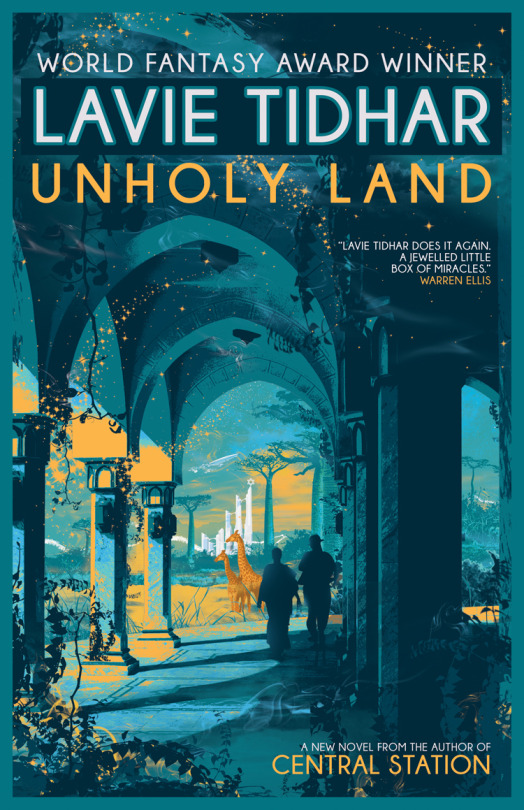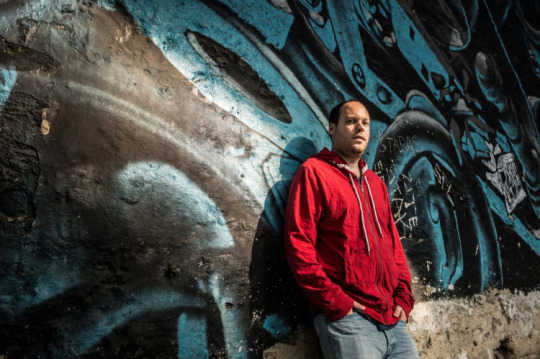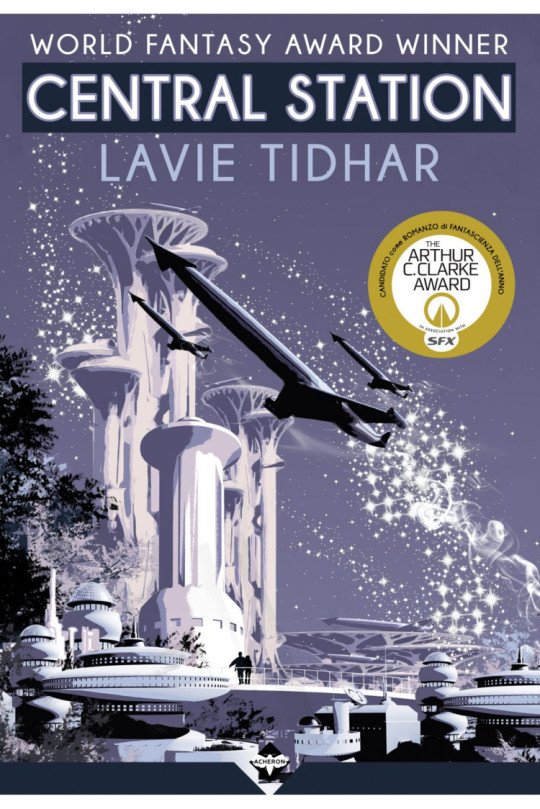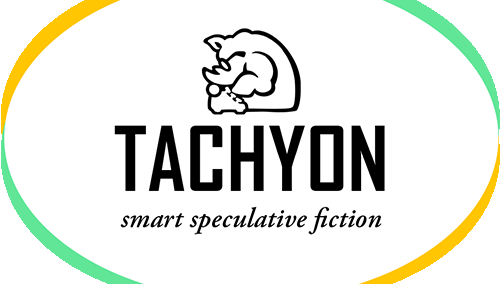Lavie Tidhar’s thought-provoking UNHOLY LAND is a powerful meditation on the ethics of history and the power of borders
Lavie Tidhar’s new novel UNHOLY LAND continues to garner effusive praise.

PUBLISHERS WEEKLY includes the title among their best of 2018.
In this head-spinning tale, a novelist is displaced between parallel universes—one like ours and another where Jews have founded an Israel-like nation on the Ugandan border—and also begins to think he’s a character in one of his detective stories. Tidhar has a gift for the details that make the setting feel entirely real even as reality itself is called into question.
Sean Guynes-Vishniac for WORLD LITERATURE TODAY enjoys the novel.
Like Tidhar’s other work, UNHOLY LAND is a complex and metatextual narrative, moving between first-, second-, and third-person narrators, that theorizes the work speculative fiction does—the possibilities and alternatives it imagines—and questions the worth of the “fantasy” writer in a world where nation-states maintain and legitimize their existence through the oppression of whole groups of people. It is, unsurprisingly, a powerful meditation on the ethics of history and the power of borders, an analogy, no doubt, to the border walls both on the West Bank and in Trump’s presidential promises as much as to the ideologized divides that drive military and state conflict. UNHOLY LAND is a call to imagine and fight for alternatives.

Photo: Kevin Nixon © Future Publishing 2013
THIERSTEIN.NET is fascinated with the book.
It’s not as light, not as dancingly sparkling with ideas and concepts as a lot of the former is, but at the same time it’s maybe heavier, worthier, loaded with thought-provoking takes on identity, the fluidity of reality, and weighty moral questions which are exhibited rather than discussed or preached.
It starts simple enough, though – we follow one Lior Tirosh (a thinly disguised alter ego, it appears), a moderately successful writer of ‘inconsequential fantasies’ in some personal crisis, as he is headed to Ararat City, Palestina. Which is set in Africa, in the Great Rift Valley. And so we know we are in an alternative history – or, to be more precise, in a world where the Wilbush expedition to British East Africa returned a different report, had a different outcome, and a Jewish state, a Nachtasyl, was created instead of the country we are familiar with. At first this is, like all such conceits, mightily disorienting. We see Palestinians, who speak Judean, and a culture which inevitably has taken on parts of the area it has settled in and the people it displaced, whilst retaining a lot of the tensions and drivers that brought it here.
But back to Tirosh – he is here to visit his ailing father, a general and famous figure, we learn later on. But instead he gets, more or less from the go, caught up in strange happenings involving Border/Secret police, multiple agencies following him, murder (it’s actually an attempt on his life which catches an acquaintance), a disappeared niece who campaigned for the rights of the native population, a builder who builds the wall designed to keep the terrorists and suicide bombers out… it’s a fascinating and dizzying world, and you get absolutely no time to get used to it before the action kicks off.
“Then he asked you if you thought the world was real”
And just when you think you know where you are with the premise and the setting then the story takes a sharp turn into the leftfield. Tirosh is a damaged man – not just from the loss of his son and his wife, but there is something else. He comes from “Outside”. He has visions of other worlds, of concentration camps. We see several agencies who work across different worlds, across possibilities. We learn that the wall has other aims than simply keeping Suicide Bombers out. That time can run differently on the Outside. There is more, so much more, and most of it only gets hinted at, is never explained or barely shown. And boy would I have wanted to see, learn, read more.
In LOCUS (November 2018), Gary K. Wolfe reviews UNHOLY LAND.
By extending Tidhar’s exploration of multiple and metafictional realities in even more sophisticated and assured ways than his earlier novels, UNHOLY LAND is quite an irritated oyster.

Michele Bellone for the Italian ESQUIRE profiles Lavie Tidhar.
In Italy it is little known but, thanks to the commitment of two small but dynamic publishers, its name is circulating a lot in the field of science fiction fans, and not only. Between July and September, Acheron Books (which in March had already released Jews against Zombi , horror anthology curated by Tidhar) and Future Fiction have published CENTRAL STATION and Terminale Terra, two works of science fiction that well represent the particular style of a author decidedly not very mainstream.
“On an international level, Tidhar is perhaps more known as an editor than author, having edited some anthologies of the Apex series book of world science-fiction that gave him great visibility and for which he won several awards”, tells Esquire the writer Davide Mana, former translator of Hebrews against Zombi and curator of the Italian version of CENTRAL STATION. What has made it very popular abroad but hampers it in our country I think it is the huge variety of styles and literary genres that can handle. It is very difficult to pigeonhole it and this has probably displaced our local publishers. In CENTRAL STATION he writes scientifically credible science fiction stories using tones and formulas of fantasy, and this reminds me of equally refined and literary authors such as Roger Zelazny and Samuel Delany, who have recovered the structures of ballads or folk tales, creating new mythologies also sci. Just like Tidhar does.”

Cover by Simone Ferraro
CENTRAL STATION and Terminal Terra are, in a sense, two complementary books, which represent two different approaches to the fantastic narrative of a very difficult author to frame within a given genre – to give an idea, his latest work is Candy, a book for kids that Mondadori will publish in 2019 – and that for this reason could make the purists of science fiction or fantasy turn up their nose, but that deserves to be explored for its engaging and creative originality.
Translation from Italian courtesy of Google
For more info on UNHOLY LAND, visit the Tachyon page.
For more info about CENTRAL STATION, visit the Tachyon page.
Covers by Sarah Anne Langton
